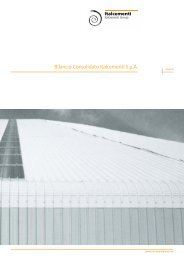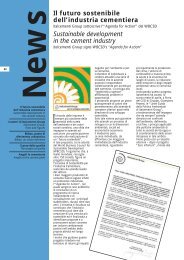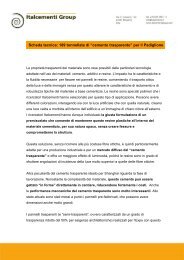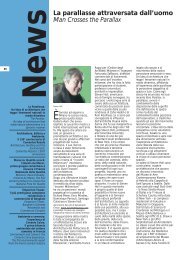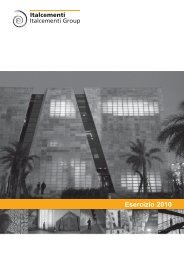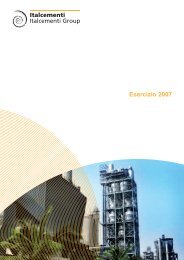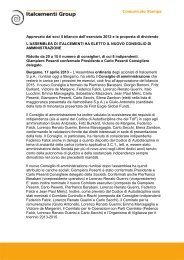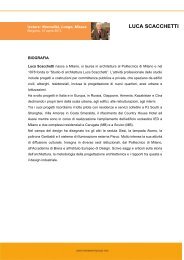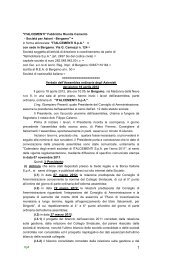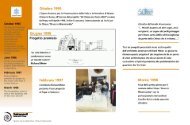2011 Annual Report - Italcementi Group
2011 Annual Report - Italcementi Group
2011 Annual Report - Italcementi Group
Create successful ePaper yourself
Turn your PDF publications into a flip-book with our unique Google optimized e-Paper software.
Notes<br />
The <strong>Italcementi</strong> S.p.A. financial statements as at and for the year to December 31, <strong>2011</strong>, were approved by the<br />
Board of Directors on March 2, 2012. At the meeting, the Board authorized publication of a press release<br />
dated March 2, 2012 containing key information from the financial statements.<br />
<strong>Italcementi</strong> S.p.A. is a legal entity established in accordance with the laws of the Republic of Italy. It has been<br />
listed on the Milan Stock Exchange since 1925, belongs to the S&P/Mib index of leading Italian companies and<br />
is subject to management and coordination by Italmobiliare S.p.A., whose key data from the most recently<br />
approved financial statements are provided in an annex to the separate financial statements.<br />
<strong>Italcementi</strong> S.p.A. and its subsidiaries form the “<strong>Italcementi</strong> <strong>Group</strong>”, an international player whose main lines of<br />
business are hydraulic binders, ready mixed concrete and aggregates. The <strong>Group</strong> is also active in other areas,<br />
some of which are instrumental to its core businesses: materials for the construction industry, additives,<br />
transport, energy, engineering and e-business.<br />
The Italian laws that implement EEC Directive IV are also applied, where compatible, to the companies that<br />
draw up financial statements in accordance with the IFRS. Consequently the financial statements are<br />
compliant with the articles of the Italian Civil Code and the corresponding indications of the Consolidated<br />
Finance Act (TUF, testo unico della finanza) for listed companies with regard to the Directors’ <strong>Report</strong> (art. 2428<br />
Italian Civil Code), Audit (art. 2409-bis Italian Civil Code) and Publication of the Financial Statements (art. 2435<br />
Italian Civil Code).<br />
The separate financial statements and related notes also set out the details and additional disclosures required<br />
under art. 2424, 2425 and 2427 of the Italian Civil Code and art. 27, paragraph 5 of Legislative Decree<br />
127/1991, since such requirements are not in conflict with the IFRS.<br />
The financial statements have been drawn up on a going-concern basis. Despite the difficult economic and<br />
financial situation, by virtue of the measures already in place to respond to the changes in demand, and its<br />
business and financial flexibility the company has no material uncertainties about its ability to continue as a<br />
going concern.<br />
1. Accounting policies<br />
1.1. Statement of compliance with the IFRS<br />
These financial statements have been drawn up in compliance with the International Accounting and Financial<br />
<strong>Report</strong>ing Standards (IAS/IFRS) applicable at December 31, <strong>2011</strong>, endorsed by the EC Commission.<br />
In compliance with European Regulation no. 1606 of July 19, 2002, the principles adopted do not include the<br />
standards and interpretations published by the IASB and the IFRIC through December 31, <strong>2011</strong>, that had not<br />
been endorsed by the European Union at that date.<br />
Since December 31, 2010, the following standards, amendments and interpretations endorsed by the<br />
European Union have come into force and have been applied in the <strong>2011</strong> financial statements:<br />
<br />
<br />
<br />
IAS 24 revised ““Related party disclosures” which simplifies disclosure requirements relating to related<br />
parties in which public entities are present and provides a new definition of related parties that also<br />
comprises the subsidiaries of associates and joint ventures.<br />
Amendment to IAS 32 “Financial instruments presentation” regarding classification of rights issues. The<br />
changes permit classification of rights issues (e.g., options and warrants) as equity instruments<br />
independently of the currency in which exercise price is denominated.<br />
Amendment to IFRS 1 “First-time adoption of IFRS” and the related amendment to IFRS 7 “Financial<br />
instruments: disclosures” relating to the exemption from comparative disclosure allowed by IFRS 7 on<br />
246




